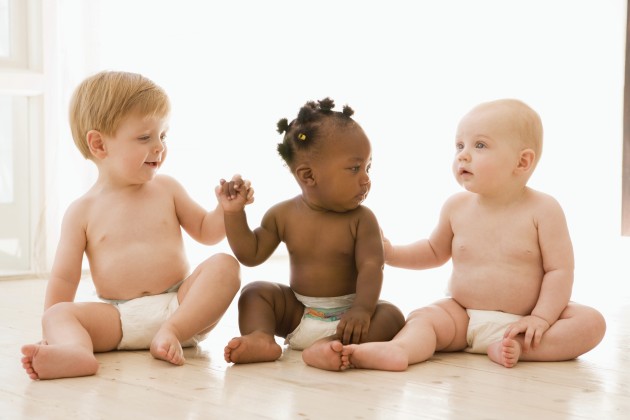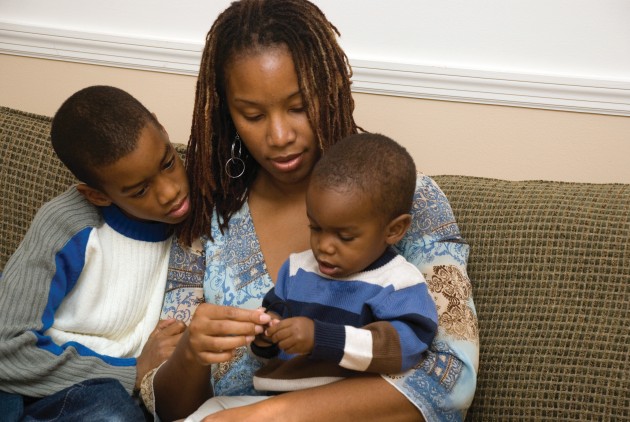1st Year
MONTH
12
1st Year – Month 12
Your Baby is One Year Old!
 Both you and your baby have come a long way. You’ve helped your baby grow into someone who can sit, stand, climb, and reach for things. They can think, feel, understand what you say, and maybe even say a few words. You can look back with pride on the past year and give yourself a well-deserved pat on the back. At times it was hard, but you managed well. Hopefully, you had some other people to help. From now on, your baby will grow and learn at an amazing rate. You can look forward to the coming years, confident that you will help them develop into a responsible and loving human being.
Both you and your baby have come a long way. You’ve helped your baby grow into someone who can sit, stand, climb, and reach for things. They can think, feel, understand what you say, and maybe even say a few words. You can look back with pride on the past year and give yourself a well-deserved pat on the back. At times it was hard, but you managed well. Hopefully, you had some other people to help. From now on, your baby will grow and learn at an amazing rate. You can look forward to the coming years, confident that you will help them develop into a responsible and loving human being.
Building Self-Confidence
Being a parent can sometimes tax your patience and your confidence in coping with daily problems. At times, you may feel comfortable and self-confident, and at other times you may feel uncertain and fearful about your decisions. We all strive to feel comfortable and good about ourselves. Self-confidence is measured by the way we feel and the way we behave. There are ways to boost your self-confidence so that you feel better about yourself.
Here are a few suggestions:
- Examine and determine what YOU want out of life — not what other people want for you or want you to do.
- Live your life from this moment on. Don’t become discouraged by past mistakes.
- Trust your own decisions. You are the best judge of what works well for you.
- Don’t put yourself down. Instead of saying, “I can’t do it,” say, “I am going to try to do it.”
What It’s Like to be 12 Months Old?
How I Grow and Talk
- I may walk, but I still prefer to crawl. It’s faster!
- I may also try to do other things while I’m walking, such as wave to you or pick up my favorite blanket.
- I stand by pushing up from a squatting position.
- I climb up and down stairs, if I have a chance.
- I may even be able to climb out of a playpen or crib.
- I hold things with one hand while I’m doing something else with the other hand.
- I insist on feeding myself.
- I use my hands to remove lids from jars. I use my index finger to point to things.
- I repeat words I know. It’s good practice. I babble away in phrases that sound like sentences.
- I make up my own words to describe objects or people.
- I may not talk as much once I walk well. I use one word to express a whole thought.
How I Respond
- I trust people I know well.
- I imitate people, even if they are not around.
- I’m still afraid of strangers and unfamiliar places.
- I am very definite about my likes and dislikes.
How I Understand and Feel
- I remember more because my memory is getting sharper.
- I hunt for a toy and, even if I don’t find it right away, I can remember where I saw it last.
- I keep trying to do something and may even solve the problem through trial and error.
- I follow simple directions and understand most things you say to me.
- I have favorites among people and toys.
- I feel great that I have a personality all my own.
- I’m developing a sense of humor and think a lot of things are funny.
- I feel secure and happy eating meals with my family.
- I feel and show love and affection to my favorite people and things.
Some children do things earlier or later than described here. Most differences are normal. Focus on what your child can do and get excited about each new skill. If you notice that your child is lagging behind in one or more areas for several months, use this list to talk with your doctor about your child’s development.
How Your Baby Learns to Feel Secure

To help your baby feel more secure, it’s a good idea to keep things the same as much as possible. Babies do not feel secure when things are always changing.
Try to follow the same schedule every day so your baby gets used to the way things will be. Feed your baby at the same time every day so they will get used to a schedule. That will help both of you feel more organized and comfortable.
Use the same words for familiar objects, such as cup or ball, so your baby will learn the names of things.
Your baby may have favorites. They will show love and affection to these things and people.
He still does not like being separated from you. There is always a feeling of relief when you return, and that’s the way it should be. You’re special to your baby!
Sleep
 Most children sleep through the night by their first birthday. When they do wake up for a few minutes, they usually go back to sleep by themselves unless they are teething or sick. Some 1-year-olds need more sleep than others. While one baby sleeps as little as eight hours, others may sleep as much as 17 hours.
Most children sleep through the night by their first birthday. When they do wake up for a few minutes, they usually go back to sleep by themselves unless they are teething or sick. Some 1-year-olds need more sleep than others. While one baby sleeps as little as eight hours, others may sleep as much as 17 hours.
How can you tell? Set a regular bedtime and watch your child’s reaction. Does your child wake up too early in the morning? If so, your short time sleeper may need a little later bedtime. Watch how your child acts during the day. Your child might need more sleep if they are fussy or if they fall asleep at strange times.
Once you set a pattern, your child will have regular times for sleep. Establish a pattern for nights and for nap time. Young children are happier when important parts of the day, such as mealtime and bedtime, stay the same.
Setting Limits
Your child understands many things you say, and they may even be able to say a few words themself. However, your baby cannot think ahead about what might happen and can only decide between the most basic choices. This means you have a challenge ahead. You have to help your baby learn rules so they can learn to manage their own behavior. Here are some easy ways to do this:
Be brief. Your child understands short, simple phrases. Give reasons for rules. Long, involved explanations won’t help.
Be clear. Your baby can understand the difference between standing in the high chair and not standing. They may be confused if the rule is, “Standing in the chair is OK when I am next to you, but it is not OK if I’m across the room.” For now, make simple rules. Use yes and no, OK and not OK, and you can do it or you cannot do it.
Be specific. Tell your child what they can do and what they can’t. If your baby is throwing blocks, tell them, “Blocks are not for throwing. Stack the blocks like this.” Be ready to take them away from the blocks if they does not stop throwing them. Or you could give them a soft toy that you think is OK to throw. This focuses on positive rather than negative behavior.
Be consistent. At this age, a child cannot adjust to differences in rules set by parents or by child care providers. Don’t forbid an activity such as jumping on the bed one minute and allow it the next. It’s good to be flexible sometimes, but most of the time, decide what you want the rules to be and be firm about them.
Admit feelings. Sometimes children do things that make parents angry. When you feel angry, admit it. Don’t make your baby feel like a bad person just because they did something bad, and don’t scare them. Say in a firm voice, “I’m really mad that you did that.” Remember it’s what they DID, not YOUR CHILD that made you angry. They will understand how you feel. When you admit your anger without yelling, calling names, or hitting, you are teaching them how to deal with their own angry feelings. They will learn how to express anger without hurting others.
Lighten up. See the humor in things. Don’t make an issue out of everything. Instead, choose your battles wisely and relax about the rest.
What You Can Do to Help Your Baby Learn
What you do with you baby now will make a difference later. To help your child do well in school later, do these things now:
Floor freedom – Provide safe space and encourage your baby to explore by crawling and walking. Do not keep them in a crib, high chair, walker or swing all day.
Language – Talk to your baby, explain things to them, and expand on what they try to say. For example, if they say, “Doggie”, say, “Yes, it’s a big brown dog and he’s wagging his tail.”
Outings – Take your baby places, such as the grocery store, post office, fair, and park.
Just enough help – Help a little bit, but not too much. For example, put chairs together so an early walker can hold onto them while walking. As the child walks more, move the chairs a little more apart to make it more
Build Good Eating Habits
You can do a lot of things now to help your baby build good eating habits for the rest of their life.
Set a good example by serving and eating a variety of nutritious foods. Eating nutritious foods is good for your physical and emotional health, too.
Sit down and eat with your child. Try to have the whole family sit down together at least once a day. It’s a good time to connect with each other.
Smile and pay attention to your child when they eat the nutritious food you’ve given them.
Remember babies do not spend very much time eating. When they are done, let them out of the high chair to play somewhere else. Never make eating a power struggle.
Babies and adults need good healthy food to live. Spend time preparing and enjoying good foods.
How Much Should My Baby Eat?
Your baby doesn’t have to eat something from every food group at every meal. They may eat several types of food at one meal, and only one type of food at the next meal. They might not eat anything at the third meal, if they aren’t hungry. That’s OK.
One hearty meal a day plus four foods from the food groups listed below are about average for this age. Forcing babies to eat can work in reverse and make them refuse to eat any food. Or they may continue to eat just to get your approval.
Offering food to babies when they are upset may quiet them for a few moments, but it will also teach them the habit of using food as a solution to problems. Instead, try to find the cause of the problem and solve it, without using food to make your baby feel better.
Parents are responsible for what babies eat and when food is offered. Babies are responsible for how much they eat.
Feeding Your Baby: What and When?
Most experts recommend that a baby should be at least 1 year old before whole milk is given. Until your baby is 1 year old, breast milk or formula (2-3 cups daily) is the best milk to feed them.
In addition to milk, give several small servings from each of the following food groups:
- Vegetables, fruits
- Cheese, yogurt, cottage cheese
- Meat, fish, poultry, eggs
- Bread, crackers, cereal, rice, spaghetti
Common Household Products Can Poison Children
You know your child likes to put things in their mouth to taste them. Maybe you don’t know that children will eat poisons even if they taste bad – poisons such as mothballs and drain cleaner. Only as we get older do we learn that bad-tasting things may be harmful.
It’s your job to protect your child from poisons in your home. Listed at the right are some common household products that are poisonous.
If your child eats something poisonous, immediately call the Poison Control Center at 800-222-1222 and tell them what your child ate. They will tell you what to do.
If your child is having convulsions, stops breathing, or loses consciousness, call 911.
Poisonous Products Found In Your Home
In the Kitchen:
Dishwasher soap, oven cleaner, floor and furniture polish
In the Bathroom:
Prescription drugs, aspirin, and aspirin substitutes, vitamin and iron pills, tranquilizers, birth control pills, cold and cough medicines, cosmetics, mouthwash, perfume, drain cleaner, disinfectants, rubbing alcohol
In the Laundry:
Bleach, detergent, fabric softener, stain remover
In the Storeroom and Other Rooms:
Kerosene, lighter fluid, gasoline, paint, paint thinner, turpentine, weed killer, pesticides, rat poison, fertilizer, house plants, garden and yard plants, tobacco, any alcohol, mothballs, paint chips or dust
Ways to Prevent Childhood Poisoning
Store poisonous products in a locked cabinet and out of your child’s reach. Return products to the locked cabinet immediately after you use them.
Never put a poison in food or drink containers. Someone may think it is food and eat it.
Watch out. Other people’s homes may not be childproofed.
Don’t take medicine in front of your young children. Never tell children their medicine is candy. This will help them think it’s OK to eat medicines as if they are candy. They might eat the medicine and hurt themselves.
Do not use syrup of ipecac. In years past, syrup of ipecac was used to make children vomit or throw up the poison. Now doctors feel this can do more harm than good, so do not use it. Vomiting may not help a child who has swallowed a poisonous substance.
Look up the phone number for your Poison Control Center. Write it down and keep it by every phone in the house. The universal number in the United States is 800-222-1222.
What’s Ahead?
By the end of the first year, your baby has developed their own personality. Your baby is a full-fledged member of your family. It’s hard to imagine what life was like without them! In the months ahead look forward to your child doing the following:
- Sleeping about 12 hours at night, and getting up early in the morning
- Needing a longer nap on some days
- Usually wanting attention when waking up
- Having a varied appetite, especially while teething; after 12 months, children grow more slowly and eat a little less
- Having a language “explosion”; a 12-month-old may speak two or three words while a 2-year-old may know 200 to 300 words
- Exploring and playing with genitals or private area; this is normal curiosity
- Starting to show independence without really knowing what they want; you may hear “No!” and “Me do it.” a lot
- One or two words will stand for many things. “Mommy” may mean, “Where’s Mommy?” or “Mommy, play with me” or something else entirely. It’s up to you to figure out what they mean, so be patient and understand this will pass as they learn how to talk with you.
Reminders
Subscribe: If you are not already a subscriber, you can receive the newsletters direct to your email on your child’s birthday. Register at JITP.info (English) or (Spanish).
Every baby is unique: When reading this newsletter, remember: Every baby is different. Your growing baby may do things earlier or later than described here.
Updates: We are constantly reviewing and updating JITP.info. See our current plans on the About Us page. Do you have questions or corrections? Email us at contact@jitp.info.
Credits: This newsletter was reviewed and updated in 2020 by YaeBin Kim and Dan Weigel (University of Nevada-Reno) and Anne Clarkson (Wisconsin-Madison Extension).